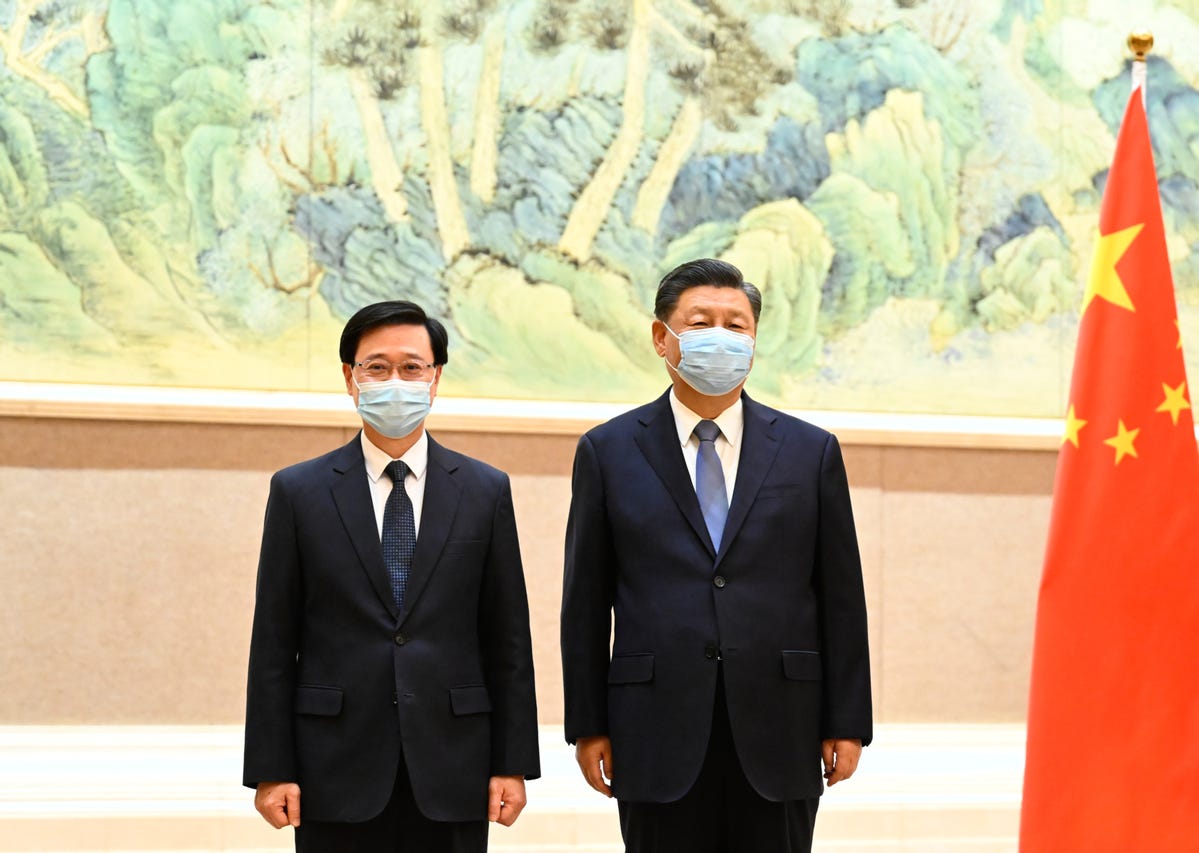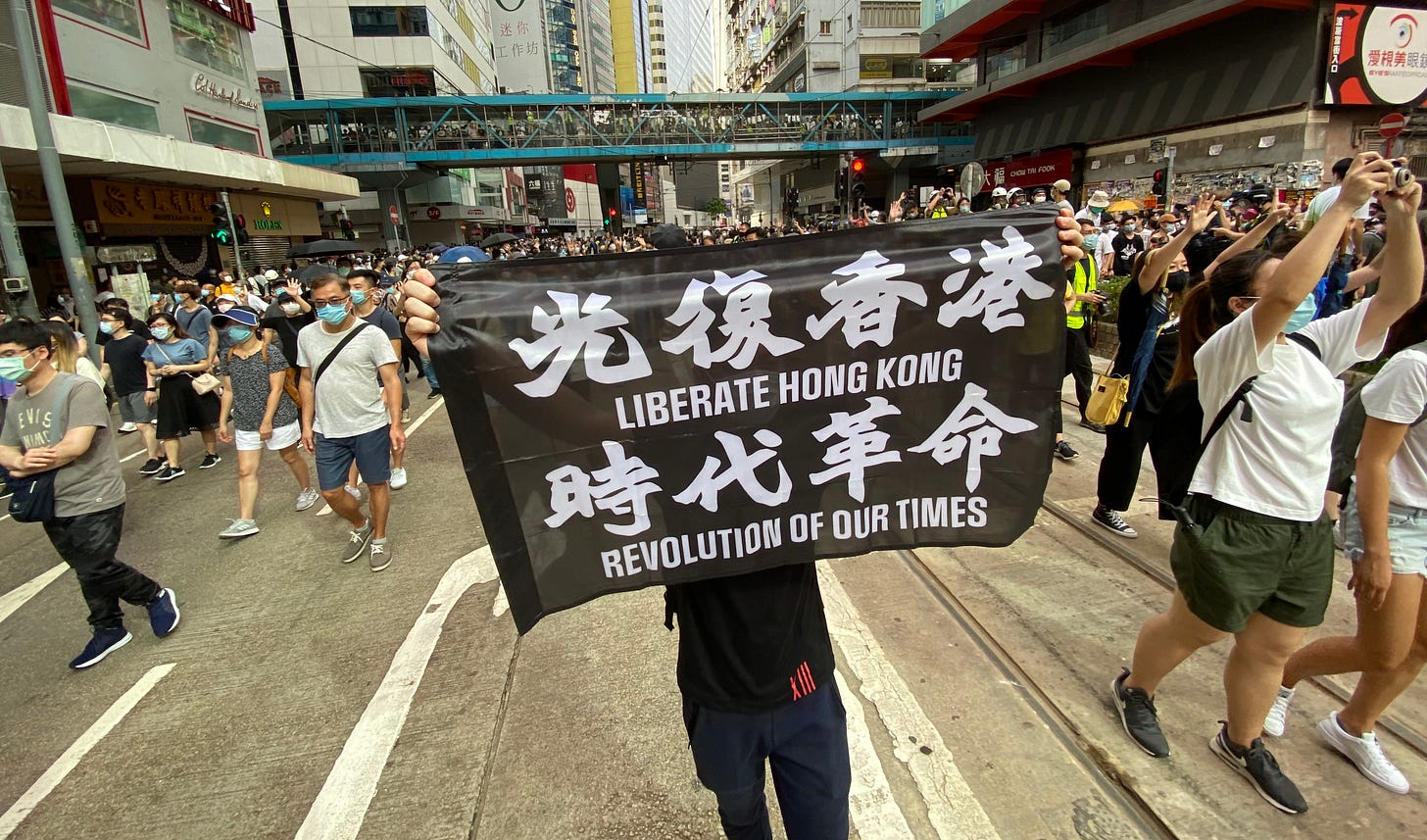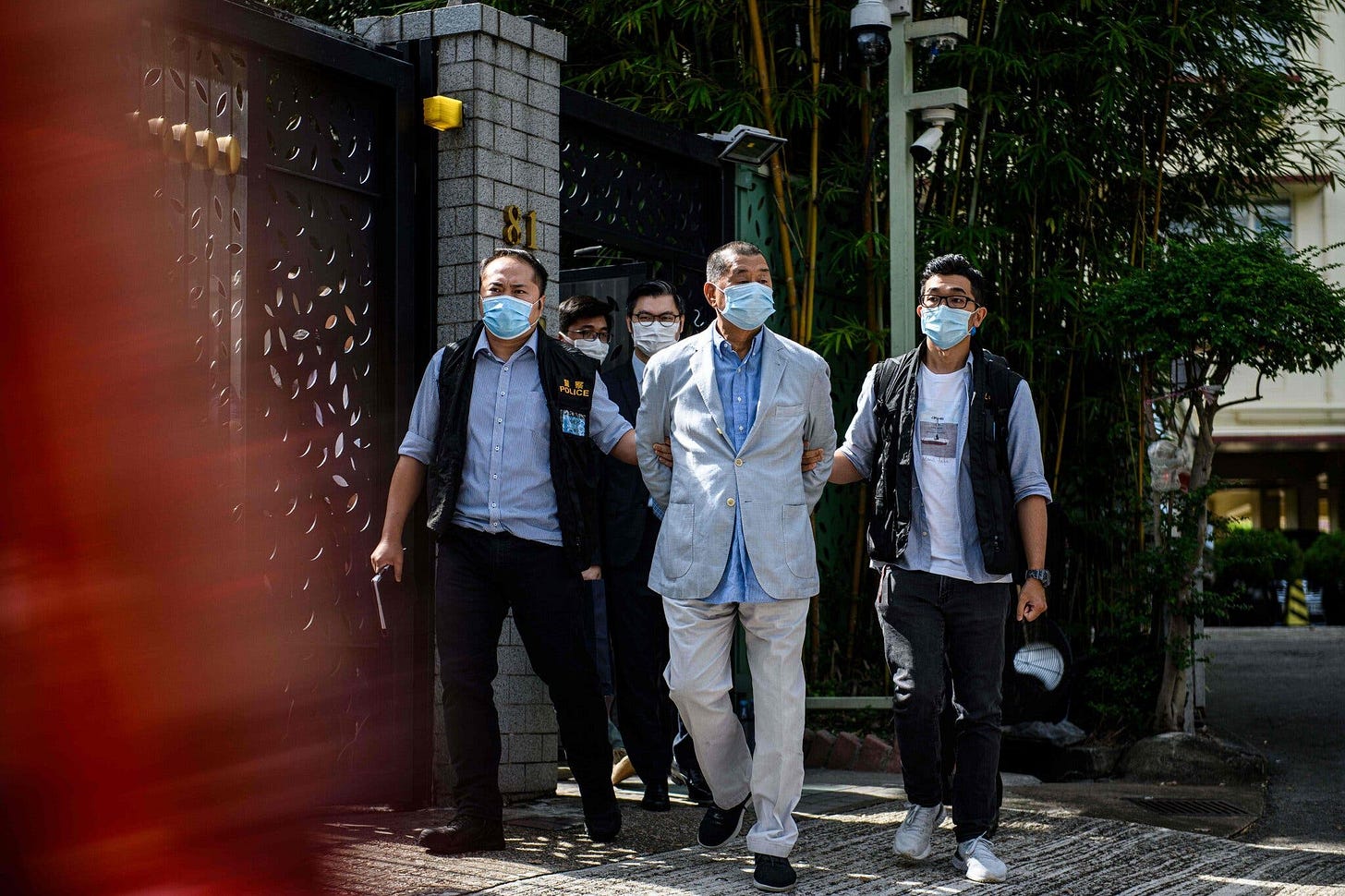Beijing’s New Year's surprise: awarding itself broad new powers over Hong Kong
Under Beijing's new "interpretation" of the National Security Law, it has formalized its power to rule the city by decree
As we reach the end of 2022, some of you may be looking for ways to financially support the movement for Hong Kong’s future. I’d be grateful for your consideration. My articles on Hong Kong legal and political issues are freely available to all, but the effort is made possible by donations from readers. If you find this work worthwhile and would like to support its continuation in 2023, please consider becoming a paid subscriber for US$8/month or $80/year. You can cancel at any time.

Beijing often takes particularly controversial actions on Hong Kong during the quiet final week of the year, and this week was no exception. On Friday, the Central Government (via the Standing Committee of the National People’s Congress) issued an “interpretation” of Hong Kong’s national security law. While framed as a mere clarification, in reality the three-paragraph document is a declaration of vast new central government powers over the city.
While on its surface the interpretation dealt with the narrow, if important, issue of the use of foreign defense lawyers in national security cases, Beijing took the opportunity to reach its tentacles far into the previously-independent Hong Kong judiciary, as well as declaring broad new power to interfere with all aspects of Hong Kong’s governmental and political systems. As I’ll explain in this article, the interpretation formalizes Beijing’s expansive (and unconstitutional) power over the judiciary and any other government body, company, or individual in Hong Kong that it perceives as challenging its interests.
Background
Last month, the Hong Kong Court of Final Appeal ruled that wrongfully imprisoned pro-democracy media tycoon Jimmy Lai could appoint a foreign lawyer to represent him in his upcoming national security trial—long an established right in Hong Kong. As a policy matter, one can debate whether and when foreign lawyers should be able to represent clients, and every jurisdiction has its own rules, but from a legal standpoint the right to do so in Hong Kong is clear and well-established. The courts cited the UK lawyer’s expertise in human rights law as a valid reason for his appointment—undoubtedly important in a prosecution of a press figure in part for the articles he printed.
In the new, “patriotic” Hong Kong, however, Beijing and the local government weren’t willing to accept the primacy and finality of the Court of Final Appeal’s ruling. Within hours of the decision, Hong Kong’s Chief Executive John Lee—a former cop and security official handpicked for the job by Beijing—announced that he would “request” that Beijing interpret the National Security Law to overturn the court’s ruling. As you may have gathered from my use of scare quotes here, this wasn’t actually a request: Beijing had decided to overturn the final court ruling, and in order to maintain the fiction of Hong Kong’s autonomy, the Chief Executive’s request was a required bit of political theatre.
The Chief Executive now holds power over nearly all aspects of national security trials
Beijing’s interpretation reached well beyond the appointment of foreign counsel, but first let’s assess what Beijing decided on this specific issue. Once Chief Executive Lee made his “request” for Beijing to issue an interpretation of the NSL, there was never much doubt that Beijing would interfere with the courts to ensure foreign lawyers were banned from national security cases (though even some of Beijing’s allies seemed to get cold feet when they realized the implications for the city’s future).
However, there were various ways that Beijing could have barred these lawyers. Many Hong Kong watchers expected Beijing to rule simply and directly that under the NSL, foreign lawyers must be prohibited. Indeed, in his press statement announcing that he would be requesting the interpretation, Chief Executive Lee cited NSL Article 62 as justification for requesting a ruling that “the local laws of the HKSAR [allowing appointment of foreign lawyers] are inconsistent with” the NSL, and he cited Articles 3, 8 and 42 as justifying a ruling that the courts, by allowing foreign lawyers, are not “perform[ing] the duty to effectively prevent acts and activities endangering national security.” Neither of these grounds were, from a legal standpoint, strong or even reasonably arguable, but that was of course irrelevant to what would be a purely political decision by Beijing.

But in the end, Beijing ignored this narrower option entirely. Instead, in an announcement that surprised me and others (but really shouldn’t have), Beijing decided to go with the most sweeping, repressive approach possible, one that signaled loud and clear that the Central Government has no intention of preserving even a hint of Hong Kong’s prior autonomy or judicial independence. Citing Article 47 of the NSL, Beijing ruled that the Hong Kong Chief Executive, who is appointed by Beijing, had the power to decide whether to allow a defendant to appoint a foreign lawyer. Article 47 reads:
“The courts of the Hong Kong Special Administrative Region shall obtain a certificate from the Chief Executive to certify whether an act involves national security or whether the relevant evidence involves State secrets when such questions arise in the adjudication of a case. The certificate shall be binding on the courts.”
Beijing declared that under this provision, defense lawyers or agents representing clients “in crimes endangering national security may pose national security risks,” and thus, the court must ask the Chief Executive to certify whether the lawyer will be allowed to represent the defendant.
Article 47, of course, says no such thing. It requires the courts to abide by a Chief Executive certification that a case involves national security for purposes of NSL procedures; it does not allow the Chief Executive to declare what those NSL procedures will entail, or create new NSL requirements such as a requirement to use local counsel. Beijing surely knows that their interpretation is legally incorrect, but under Article 65, Beijing’s NSL interpretations cannot be reviewed or challenged, and are thus final.
Yesterday’s interpretation expands the already broad power of the Chief Executive to control court proceedings in national security cases. Under Article 44 of the NSL, the Chief Executive appoints national security judges. Under Article 18, the Chief Executive appoints the head of the DOJ’s national security prosecutions office. Under Article 46, the Chief Executive-appointed Secretary for Justice can bar a jury from hearing a case. And now, under the Article 47 interpretation, the Chief Executive can declare a defendant’s choice of counsel barred from participation in the case. Thus, the Chief Executive comprehensively holds power over both parties’ counsel, the judge, and the jury—an impossible prospect for national security defendants, and a death knell for judicial independence and due process (both of which were already on life support, at best).
Taking it a step further: Beijing’s vast expansion of central power over Hong Kong’s legal and political systems
Beijing’s interpretation did not stop there, however. Never one to miss an opportunity for a power grab, Beijing decided to use the occasion of the interpretation to vastly expand its own power in Hong Kong by creating a mechanism for its representatives in the city to overrule virtually any court, governmental, or political decision.
Articles 12 and 13 of the NSL establish the Committee for Safeguarding National Security, which is chaired by the Chief Executive and is directly “under the supervision of and accountable to” Beijing. It is understood to be Beijing’s principal organ for coordinating its ongoing crackdown in the city. Article 14, cited by Beijing in its interpretation, lays out the Committee’s duties:
(1) analyzing and assessing developments in relation to safeguarding national security in the Hong Kong Special Administrative Region, making work plans, and formulating policies for safeguarding national security in the Region;
(2) advancing the development of the legal system and enforcement mechanisms of the Region for safeguarding national security; and
(3) coordinating major work and significant operations for safeguarding national security in the Region.
Under the new interpretation, Article 14’s duties now include “the right to make judgments and decisions as to whether an issue involves national security.” In the context at hand—defense appointments of foreign counsel—the interpretation provides that if the court does not seek a certificate on the issue from the Chief Executive, the Committee will step in to unilaterally decide the matter.
Yet, the new powers granted to the Committee extend well beyond narrow issues in a single court case, as they allow the Committee to declare any act—whether by the courts, government officials, or private citizens—to “involve national security.” Whenever they use this power, the Committee can then act by decree, overruling any Hong Kong law, official act, judicial decision, or individual freedom in the name of national security.
The Committee’s new power allows it to divert any case it wishes into the parallel national security court process, which strips away rights from national security defendants including the right to bail, jury, public trial, independent judges, and now choice of counsel. In December 2021, the Court of Final Appeal ruled in HKSAR v. Ng Hau Yi Sidney that the national security law’s repressive court procedures applied not only to the four crimes set out in the law itself, but also to any local laws that implicated national security. Now, as a result of Beijing’s interpretation this week, the Committee can declare any case, brought under any charges, to implicate national security, forcing the court to then strip away these rights from the defendant and transfer the case to a national security judge.
Perhaps this wouldn’t be such a big deal, and perhaps would even sound reasonable to some, if “national security” here really involved serious threats to the security of the nation—terrorism, for example. But “national security” as Beijing defines it is far broader than one might expect. Just take a look at the Hong Kong government’s official slide deck for its “National Security Education Curriculum,” a program implemented under Article 10 of the NSL. On page 8, the government lists 16 areas that it considers to involve national security most of which it describes as “non-traditional security”:
“political security, homeland security, military security, social security…, economic security (e.g. finance, currency), resource security, cultural security (e.g. minority cultural protection and diversity), technological security (self-reliance and self-improvement of scientific and technological capabilities), network security, nuclear security, ecological security…, overseas interests security, space security, deep sea security, and polar security.”
Under Beijing’s interpretation yesterday, the Chief Executive and the Committee for Safeguarding National Security now have sweeping power to regulate and interfere with all aspects of these 16 areas, and anything else they decide they want to interfere with—and no one in Hong Kong has the power to challenge them.
The interpretation has implications well beyond criminal cases, including for businesses
It’s worth noting that the subject of the interpretation appeared in the context of a criminal case, but was not a criminal matter itself. The legal question that Beijing declared a “national security issue” was whether and when counsel could be appointed to represent a client. Under the terms of the interpretation, this question and many other technical questions like it could be invoked in a wide range of contexts, including civil disputes, that the Committee for Safeguarding National Security unilaterally designates as relating to national security.

For foreign businesses still operating under the belief that Hong Kong’s national security crackdown won’t affect their interests, Beijing’s interpretation should be alarming. Whenever Beijing has granted itself or its appointed government in Hong Kong new powers, they use them liberally. It’s only a matter of time before they exercise them against the great bogeyman of Chinese national security propaganda: foreign forces.
Let’s say American bank Goldman Sachs—with its large presence in Hong Kong and China—finds itself in a financial dispute over a deal gone wrong with a Chinese banking partner. Goldman sues the Chinese bank in Hong Kong court to recover damages. Depending on who in China is invested in the local bank’s success and for how much, one could easily see Beijing considering the suit to be a threat to its “economic security,” “technological security,” or any other category of national security. Under this week’s interpretation, the Committee for Safeguarding National Security can simply step in to order the courts to rule against Goldman—and there’s absolutely nothing that Goldman, the courts, or anyone else can do about it.
The new power also extends to non-court matters. Under the interpretation, the Committee could exercise its power to seize corporate assets, halt business operations, evict corporate tenants, or take any other action against companies or individuals operating in Hong Kong—so long as it first declares that it’s doing so in the interests of national security. Don’t like it? Tough: the interpretation prohibits appeals or challenges.
No wonder Beijing chose the Christmas week to slip this one in under the radar. Happy New Year, folks.





One Country, No System . . .
Thanks for the effort!